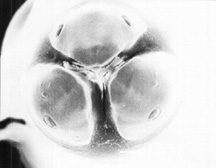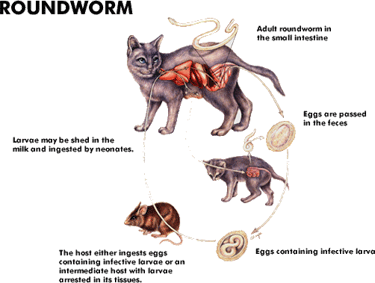How do Roundworms affect your dog?
Dog feces is more than
just a nuisance - it can pose a serious health hazard. Why? A number of
common parasites, including
round
worm, are transmitted via dog feces. When infected dog droppings are
left on the ground, the eggs of the roundworms and other parasites can
linger in the soil for years. As a result, anyone who comes in contact
with the soil also comes in contact with the infected eggs.
Children run the greatest risk of infection because they're prone to
play in the dirt at the park or playground and then put their hands in
their mouths or rub their eyes with their hands. But even a group of
teens or adults playing Frisbee or touch football in an open area could
be in danger. Parasitic infections can make humans extremely sick, and
for pregnant women, can pose a serious harm to their unborn child.
 What
are roundworms?
Roundworms describes a whole bunch of different worm parasites. The most
common dog roundworm is Toxocara canis. Humans have a different
roundworm, as do cats, horses, pigs, and other animals. Dogs get
roundworms either from eating worm eggs off the ground or because the
mother dog was infected and passed the worms to her puppies during her
pregnancy. Adult roundworms have a funny face, with three big lips
surrounding their mouth. They feed on partially digested food in the
dogs intestine. What
are roundworms?
Roundworms describes a whole bunch of different worm parasites. The most
common dog roundworm is Toxocara canis. Humans have a different
roundworm, as do cats, horses, pigs, and other animals. Dogs get
roundworms either from eating worm eggs off the ground or because the
mother dog was infected and passed the worms to her puppies during her
pregnancy. Adult roundworms have a funny face, with three big lips
surrounding their mouth. They feed on partially digested food in the
dogs intestine.
Although the risk to humans is
slight, roundworm is a major health concern. Roundworm lives in
the small intestine of dogs. It is a microscopic and parasitic organism.
Eggs are passed into the environment in the dog's waste. The eggs then
take two weeks to a month to become infective.
There is no risk from fresh
dog waste. But after becoming infective, eggs can remain in the soil for
several years
Humans do not develop adult
roundworms, although migration of larvae through tissues and organs can
cause disease. Humans usually become infected through contact with eggs
in the soil or by accidental ingestion.
Direct contact between
infected dogs and humans is not considered to play a role in the
transmission of roundworm. Young children are at the greatest risk. They
often eat dirt and grass and fill their mouths with contaminated hands.
Hand powered wheel chair users and field sports players also face
greater risks.
Roundworm is not present in
dogs that receive regular worm treatments. Picking up dog waste before
roundworm eggs can become infective is equally important.
 |
